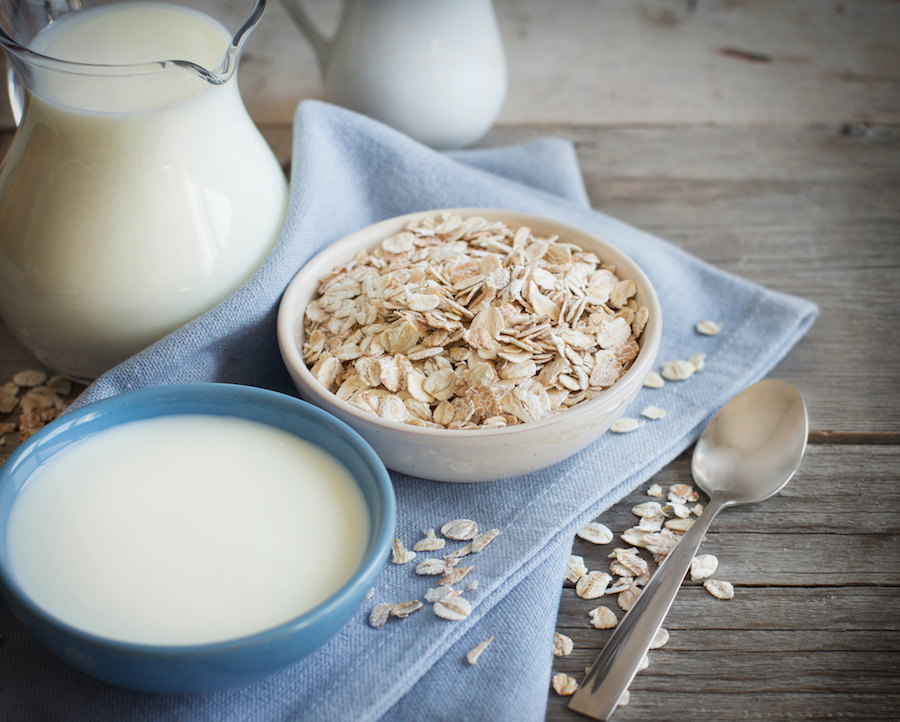Why you’ll soon be adding oat milk to your morning coffee
Forget almond milk, here’s a new vegan blend we’ll soon be swirling into our beetroot lattes, says Liz Connor
Now that almond milk has become a billion pound industry, the craze for plant-based dairy has officially gone global, and the market is booming with potential. But while the rest of us are still tentatively getting our chops around nut alternatives, the wellness brigade has already moved on to pastures new. Enter: oat milk – the cruelty-free substitute of the moment.
The dairy-free, gluten-free and nut-free formula is made from blending steel-cut oats and water together and then separating the liquid from the solid mulch. Most of us can agree, the process doesn’t exactly sound appetising, but the flavour is surprisingly delicious; coffee drinkers are praising it for its malty taste, creamy texture and similarities in constitution to cow’s milk. Unlike soya milk, it also works well when heated, can be foamed up into lattes and doesn’t curdle or split in the pan.
The trend isn’t entirely new; Nordic countries like Sweden have been drinking it for decades. The Swedes have even developed entire drinks menus riffing on the oaty drink – think capoatchino, coatado, and macchioato. Now it’s fast catching on at artisan coffee shops and organic supermarkets here in the UK as more of us choose to adopt a cruelty and lactose-free lifestyle.
One of the brands leading the charge is Oatly, a Swedish company that has been selling oat milk since 1990. With 0% added sugar, 4 grams of protein and around 120 calories per cup, the drink has struck a chord with health-conscious millennials globally, and it’s now stocked in Tesco, Holland and Barrett, Sainsbury’s and Ocado. Starbucks also made the decision to introduce oat milk into their UK menu last year.
Baristas have been quick to jump on the Instagram-approved trend, but the superfood squad say that the drink has staying power. Holland & Barrett nutritionist Emily Rollason says oat milk actually has a host of benefits that render it superior its other dairy-free competitors, namely it’s incredibly low fat content. A carton of oat milk has around 0.5g fat, of which there is 0.1g is saturated fat per 100ml in comparison, almond milk has 1.3g fat in total, 0.4g of which are saturates.
As well as promising a slimmer waistline, switching to oat milk could have cardiovascular benefits for coffee drinkers too. “Oats contain beta-glucans,” says Rollason, “natural sugars that are thought to have a protective effect for heart health, and may aid with lowering LDL cholesterol levels.“
As well as providing a new option for lactose-intolerant diners, oat milk has eco-credentials that are sure to be a lure for the growing number of ethically-conscious consumers in the UK. It has a considerably lower carbon footprint than almond milk, with almonds requiring over six times as much water to grow as oats do.
While some are whipping up oat milk at home, it might just be easier to grab yourself a carton from your local supermarket (a carton of Oatly costs around £1.80). Pour it in your coffee, add it to your tea or whip up some oat-milk porridge for a double-dose of the stuff. Just don’t be the last one on the bandwagon.
Have you tried oat milk?
The Press Association
Latest posts by The Press Association (see all)
- 6 foods that are great for your heart health - April 8, 2025
- Award-winning actors to star in Second World War film released for VE Day - April 8, 2025
- King Charles and Queen Camilla release official 20th wedding anniversary photographs - April 7, 2025
- The 5 ways drinking alcohol can affect your body - April 7, 2025
- Why you should welcome these scary-looking critters into your garden - April 7, 2025




















